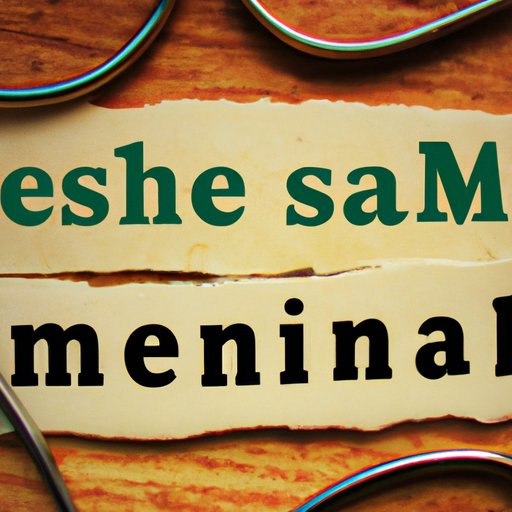Introduction
John Steinbeck’s “Of Mice and Men” is a powerful story of friendship, loyalty, and tragedy. The novella follows two migrant workers, George and Lennie, who dream of one day owning their own ranch. But their seemingly simple dream is complicated by Lennie’s developmental disabilities, which cause him to unintentionally harm others. The climax of the story comes when George, faced with a difficult decision, must decide whether to protect his friend or turn him over to the authorities. In this article, we explore the complexities behind George’s tragic decision to shoot Lennie.
Character Analysis
George is portrayed as a complex character, torn between his loyalty to Lennie and his desire for a better life. His relationship with Lennie is one of caretaker and protector, as he tries to shield his friend from the dangers around them. One potential reason why George might have felt compelled to shoot Lennie is fear of the consequences of his actions. He knows that Lennie’s unintentional harm to others could ultimately lead to both of them being punished or even killed.
However, George’s decision may also have been motivated by a desire to protect those around them. Lennie’s unintended violence has caused personal harm, and George may have felt that more people could be at risk if Lennie were to continue his behavior. Ultimately, George’s decision highlights the difficult choices that come with caring for someone with a developmental disability.
Understanding Mental Health
Lennie’s developmental disabilities, although not explicitly stated in the story, are heavily implied through his behavior and interactions. His inability to understand social cues and his physical strength make him a danger to himself and others. It is important to understand the implications of developmental disabilities and how they can affect behavior and interactions with other people.
These disabilities may also have affected George’s actions leading up to the shooting. He may have felt responsible for Lennie’s behavior and struggled with the balance between protecting his friend and protecting others. The story highlights the need for support and care for both individuals with developmental disabilities and their caretakers.
The Dangers of Toxic Masculinity
Societal pressures on men to be tough and in control can lead to harmful behavior and irrational decision making. George’s decision to shoot Lennie may have been influenced by these societal expectations, as he felt compelled to take control of the situation and protect those around them.
However, the story also shows the vulnerability and emotional complexity of male relationships, as George’s love and sacrifice for Lennie outweighed his desire for independence and control. Steinbeck’s portrayal of male friendship both challenges and reinforces societal expectations, highlighting the nuances and complexities of male relationships.
The Ethics of Euthanasia
George’s decision to shoot Lennie raises ethical questions about the morality of euthanasia. Euthanasia is the act of intentionally ending someone’s life to relieve pain and suffering, and comes in various forms such as physician-assisted suicide and passive euthanasia.
Some may argue that George’s decision falls under the category of euthanasia, as he believed that shooting Lennie was the most humane way to end his suffering and prevent harm to others. However, others may argue that the decision to end someone’s life is never morally justifiable, and that there were alternative ways to protect both Lennie and those around them.
The Role of Fate
The story of George and Lennie is full of moments that seem to foreshadow the tragic ending. From Lennie’s love of soft things to their constant need to move on, various events contribute to the ultimate outcome. But was the ending inevitable, given the circumstances?
The story forces us to question the role of fate and free will in our lives. Were George’s actions predetermined by circumstances beyond his control, or could he have made a different decision?
Love and Sacrifice
Perhaps the most complex aspect of George’s decision to shoot Lennie is the love and sacrifice involved. Through their difficult journey, George never wavers in his loyalty and love for Lennie. He sacrifices his own dreams and ambitions in order to protect his friend and care for him in a world that does not understand their situation.
While George’s decision to shoot Lennie is undoubtedly tragic, it may also be seen as an act of love and sacrifice. George knew that Lennie could never fully understand the consequences of his actions and that more harm would come if he were turned in to the authorities. By taking his friend’s life, he ensured that Lennie would not suffer and that he would never be separated from the one person who truly cared for him.
The Human Condition
The story of George and Lennie touches on themes and deeper meanings that are universal to the human experience. From the complexities of human relationships to the inevitability of tragedy, Steinbeck’s work resonates with readers of all backgrounds and ages.
The story also highlights the need for empathy and understanding for those who are different from us. It shows the power of compassion and the importance of standing by those we love, even when it is difficult.
Conclusion
The tragedy of George shooting Lennie is a complex story that touches on various themes and deeper meanings. George’s decision was a difficult one, influenced by societal pressures, his relationship with Lennie, and a desire to protect those around them.
However, the story also highlights the complexities of human relationships and the importance of love and sacrifice. It encourages empathy and understanding for those who are different from us, and challenges us to examine the role of fate and free will in our own lives.
In the end, the story of George and Lennie stands as a powerful reminder of the resilience and strength of the human spirit, even in the most difficult of circumstances.
